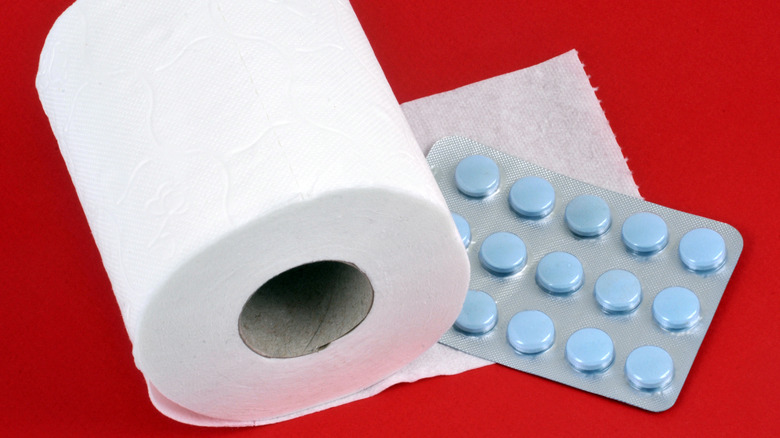What's The Difference Between Stool Softeners And Laxatives?
Constipation is ranked as the most common gastrointestinal problem, according to Cedars Sinai. Thus, it's no wonder that many Americans turn to home remedies to alleviate the discomfort associated with infrequent bowel movements. Stool softeners are over-the-counter medications that can promote more comfortable or more frequent bowel movements for short-term constipation relief. But what's the difference between stool softeners and other laxatives?
Stool softeners are a type of laxative known as emollient laxatives that help moisten and soften the stool. This lubricates the stool and makes it easier to pass, according to WebMD. While stool softeners are a class of laxatives, not all laxatives soften the stool, per Healthline. Some examples of these are bulk-forming laxatives and stimulant laxatives. Bulk-forming laxatives form a gel in the stool that effectively increases the volume of the stool by helping it hold more water. This stimulates the intestine, allowing for faster stool movement. Stimulant laxatives, as the name suggests, work by directly stimulating the intestines to promote movement and quickly pass stool through.
Generally speaking, stool softener laxatives are gentler on the body and have fewer side effects than stimulating laxatives. Common side effects for laxatives include electrolyte imbalance, cramping, nausea, and less surprisingly, diarrhea (via the Mayo Clinic).
Risk factors to consider
When considering which kind of laxative to use (or whether or not to use laxatives in the first place), it's important to weigh the risk-to-benefit ratio.
Adverse effects of laxative overuse include bloody stool, cramps, weakness, and rectal bleeding. These side effects should be discussed with a doctor immediately, according to the Mayo Clinic. Additionally, some laxatives carry a risk of medication interaction and can even worsen dangerous conditions like bowel obstruction. Because these medications tend to carry risks and side effects, Harvard Health warns that laxatives should be used sparingly.
To prevent constipation, it's best to adopt a fiber-rich diet from whole food sources like cruciferous vegetables, whole grains, and legumes. Getting enough water and physical movement can also promote regular bowel movements. Experts suggest that laxatives should only be used after making healthy lifestyle changes. This is due to the fact that laxatives can actually decrease bowel movements over time and create dependencies on the medication, impeding your colon's natural ability to contract. If you suspect that you've become dependent on laxatives, you may want to speak with your doctor about how to slowly wean yourself off them.


